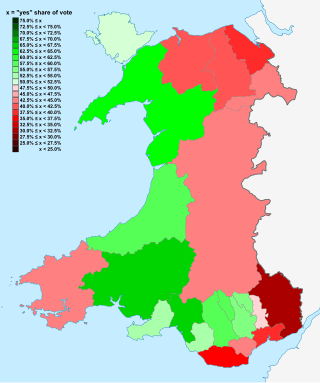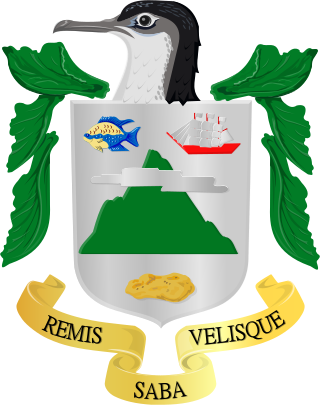
The Netherlands Antilles was a constituent country of the Kingdom of the Netherlands. The country consisted of several island territories located in the Caribbean Sea. The islands were also informally known as the Dutch Antilles. The country came into being in 1954 as the autonomous successor of the Dutch colony of Curaçao and Dependencies. The Antilles were dissolved in 2010. The Dutch colony of Surinam, although it was relatively close by on the continent of South America, did not become part of the Netherlands Antilles but became a separate autonomous country in 1954. All the island territories that belonged to the Netherlands Antilles remain part of the kingdom today, although the legal status of each differs. As a group they are still commonly called the Dutch Caribbean, regardless of their legal status. People from this former territory continue to be called Antilleans in the Netherlands.

Bonaire is a Caribbean island in the Leeward Antilles, and is a special municipality of the Netherlands. Its capital is the port of Kralendijk, on the west (leeward) coast of the island. Aruba, Bonaire and Curaçao form the ABC islands, 80 km off the coast of Venezuela. Unlike much of the Caribbean region, the ABC islands lie outside Hurricane Alley. The islands have an arid climate that attracts visitors seeking warm, sunny weather all year round. Bonaire is a popular snorkeling and scuba diving destination because of its multiple shore diving sites and easy access to the island's fringing reefs.

Referendums in the United Kingdom are occasionally held at a national, regional or local level. Historically, national referendums are rare due to the long-standing principle of parliamentary sovereignty. There is no constitutional requirement to hold a national referendum for any purpose or on any issue however the UK Parliament is free to legislate through an Act of Parliament for a referendum to be held on any question at any time.

The Scottish devolution referendum of 1997 was a pre-legislative referendum held in Scotland on 11 September 1997 over whether there was support for the creation of a Scottish Parliament with devolved powers, and whether the Parliament should have tax-varying powers. The result was "Yes–Yes": a majority voted in favour of both proposals, and the Parliament was established following an election in 1999. Turnout for the referendum was 60.4%.

The Welsh devolution referendum of 1997 was a pre-legislative referendum held in Wales on 18 September 1997 over whether there was support for the creation of a National Assembly for Wales, and therefore a degree of self-government. The referendum was a Labour manifesto commitment and was held in their first term after the 1997 election under the provisions of the Referendums Act 1997. This was the second referendum held in Wales over the question of devolution: the first referendum was held in 1979 and was defeated by a large majority.

The United Kingdom European Communities membership referendum, also known variously as the Referendum on the European Community (Common Market), the Common Market referendum and EEC membership referendum, took place under the provisions of the Referendum Act 1975 on 5 June 1975 in the United Kingdom to gauge support for the country's continued membership of the three European Communities (EC) – principally the European Economic Community (EEC, the 'Common Market'), the European Atomic Energy Community (Euratom), and the European Coal and Steel Community (ECSC). — which it had joined as a member state two-and-a-half years earlier on 1 January 1973 under the Conservative government of Edward Heath. The Labour Party's manifesto for the October 1974 general election had promised that the people would decide through the ballot box whether to remain in the EC.

Unionism in Scotland is a political movement which favours the continuation of the political union between Scotland and the other countries of the United Kingdom, and hence is opposed to Scottish independence. Scotland is one of four countries of the United Kingdom which has its own devolved government and Scottish Parliament, as well as representation in the UK Parliament. There are many strands of political Unionism in Scotland, some of which have ties to Unionism and Loyalism in Northern Ireland. The two main political parties in the UK — the Conservatives and Labour — both support Scotland remaining part of the UK.

The Australian republic referendum held on 6 November 1999 was a two-question referendum to amend the Constitution of Australia. The first question asked whether Australia should become a republic, with a president appointed by Parliament following a bi-partisan appointment model which had been approved by a half-elected, half-appointed Constitutional Convention held in Canberra in February 1998. The second question, generally deemed to be far less important politically, asked whether Australia should alter the Constitution to insert a preamble. Since the early 1990s opinion polls had suggested that a majority of the electorate favoured a republic in principle. Nonetheless, the republic referendum was defeated.

The Netherlands Antilles was an autonomous Caribbean country within the Kingdom of the Netherlands. It was dissolved on 10 October 2010.
A constitutional referendum was held in Bonaire on 17 December 2010. The new constitution would make the island a municipality within the Netherlands. Although the results showed 88% had voted against the new status, the referendum had required a 51% turnout and was subsequently declared invalid as the actual turnout was only 35%.

A status referendum was held on the island of Curaçao on 8 April 2005. The option of becoming an autonomous area within the Kingdom of the Netherlands was approved by 68% of voters.
A status referendum was held on the island of Bonaire on 10 September 2004. A majority voted for integration into the Netherlands.
A status referendum was held on the island of Saba on 5 November 2004.
A status referendum was held on the island of Sint Eustatius on 8 April 2005.
Four referendums were held in Switzerland during 1949. The first two were held on 22 May on revising article 39 of the federal constitution concerning the Swiss National Bank and a federal law amending a 1928 law on measures against tuberculosis, with both rejected by voters. The third was held on 11 September on a popular initiative "for the recurrence to direct democracy" and was narrowly approved. The final one was held on 11 December on a federal law to amend the employment status of federal civil servants, and was also approved.

On 23 June 2016, a referendum, commonly referred to as the EU referendum or the Brexit referendum, took place in the United Kingdom (UK) and Gibraltar to ask the electorate whether the country should remain a member of, or leave, the European Union (EU). The referendum resulted in 51.9% of the votes cast being in favour of leaving the EU, beginning the process of the country's withdrawal from the EU commonly termed "Brexit".
A status referendum was held on the island of Bonaire on 21 October 1994. Voters were asked to choose between the status quo, autonomy within the Netherlands, integration with the Netherlands or independence. The vast majority voted for the status quo, but in a referendum in 2004 finally decided on integration into the Netherlands.

A status referendum was held on the island of Saba on 14 October 1994, alongside simultaneous referendums on Bonaire, Sint Eustatius and Sint Maarten. A majority voted for maintaining the status quo.

A status referendum was held on the island of Sint Eustatius on 14 October 1994, alongside simultaneous referendums on Bonaire, Saba and Sint Maarten. A majority voted for maintaining the status quo.

The European Union Referendum Act 2015 was an Act of the Parliament of the United Kingdom that made legal provision for a consultative referendum to be held in the United Kingdom and Gibraltar, on whether it should remain a member state of the European Union or leave the bloc altogether. The Bill was introduced to the House of Commons by Philip Hammond, Foreign Secretary on 28 May 2015. Two weeks later, the second reading of the Bill was supported by MPs from all parties except the SNP; the Bill subsequently passed on its third reading in the Commons on 7 September 2015. It was approved by the House of Lords on 14 December 2015, and given Royal Assent on 17 December 2015. The Act came partly into force on the same day and came into full legal force on 1 February 2016.













